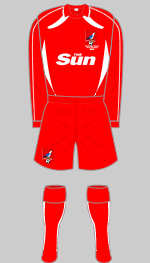
Scarborough
Formed 1879. Wound up 2007.
Promoted to Division Four 1987. Relegated to the Conference 1999.
Kit History
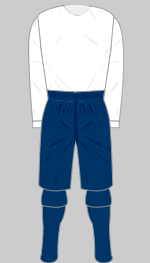
1879-1885 m
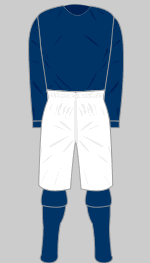
1885-1890 m
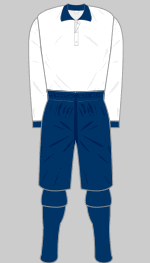
1890-1894 m s
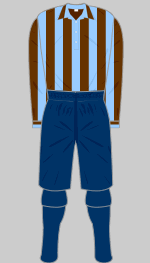
1894-1902 a j m
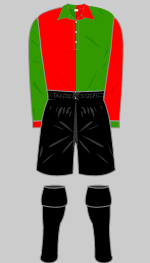
1902-1904 q t
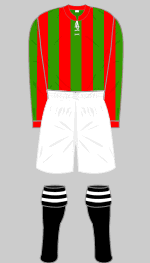
1905-1906 m

1910-1911 a j
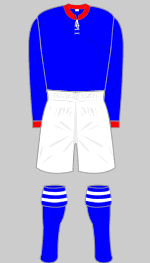
1914-1920 m

1924-1929 a j

1929-1931 a j w
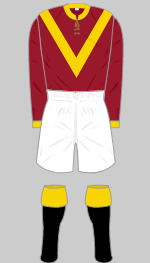
1931-1938 j w
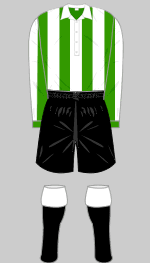
1938-1939 a j
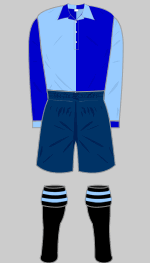
1945-1947 a j
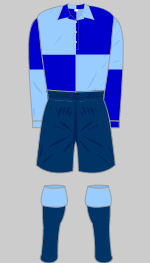
1947-1948 m
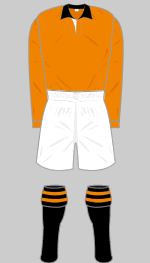
1948-1949 j
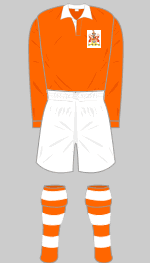
1952-1953 a j
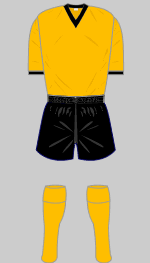
1956-1957 a

1961-1963 a
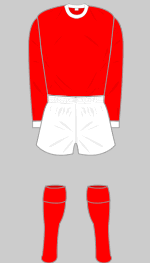
1964-1965 a
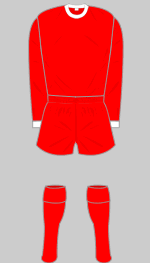
1966-1967 a

1967-1968 a

1969-1970 a
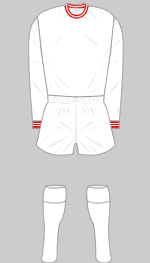
1970-1971 a
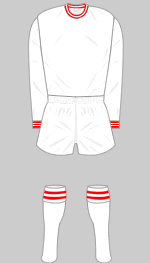
1971-1972 a
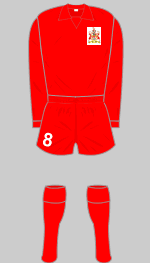
1972-1973 a
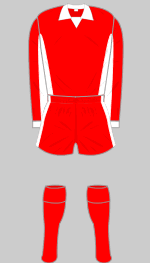
1973-1974 a o
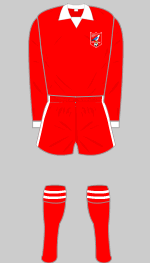
1974-1975 o w
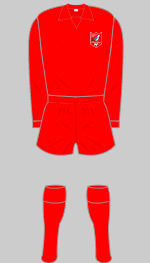
1975-1976 a
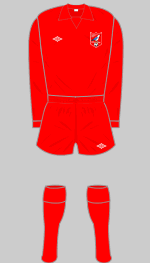
1976-1977 q
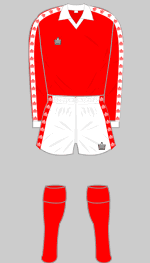
1977-1978 a

1978-1979 a l
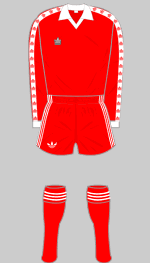
1979-1981 a q
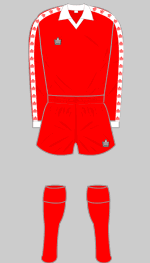
1981-1982 a
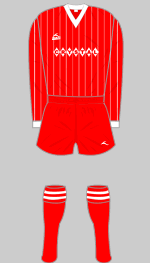
1982-1984 a h i
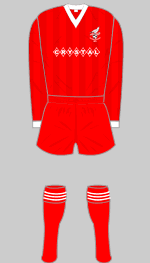
1984-1985 a h
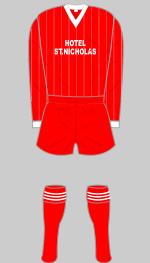
1985-1986 a

1986-1987 a
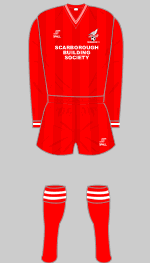
1987-1988 a c n
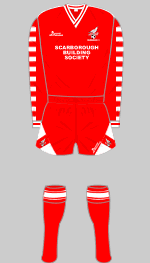
1988-1989 a n

1989-1990 a n
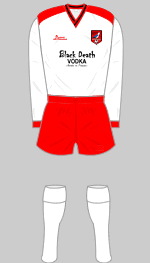
1990-1991 a

1991-1992 a k
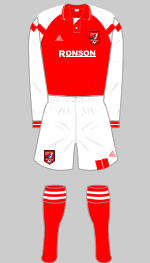
1992-1993 a b
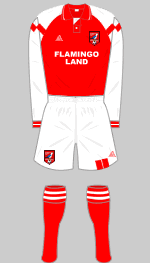
1993-1994 g

1994-1995 a

1995-1996 h k

1996-1997 a k q
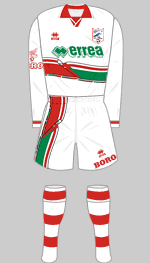
1997-1998 a g
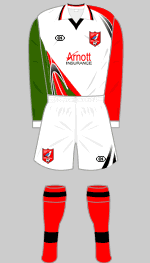
1998-1999 a

1999-2000 a i n u v

2000-2001 h
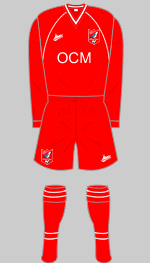
2001-2002 a i
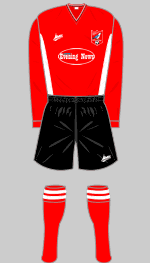
2002-2003 h
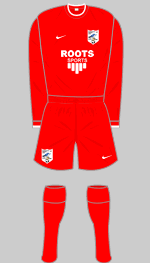
2003-2004 d

2004-2005 f
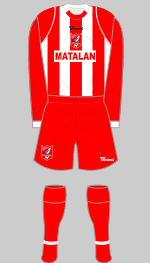
2005-2006 e
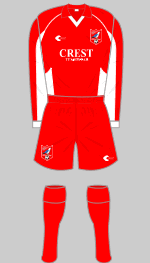
2006-2007 e
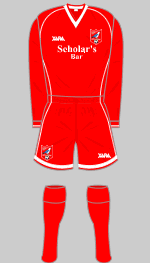
2007-2008 a h
Background
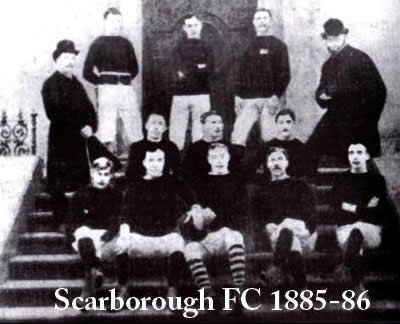 The club was formed by members
of the local cricket club in 1879 with whom they shared a ground until
1898 when they moved into the Athletic Stadium and joined the Northern
League. In 1927 the club turned professional and joined the Midland League,
winning the championship in 1930. The following season they reached the
third round of the FA Cup for the first time, only to be eliminated by
Grimsby Town. Eight years later they reached the third round once again
and took Luton Town to a replay, which they lost 0-5. Legend has it that
the club's share of the gate money was spent by players and officials
on an extended pub crawl on the journey home.
The club was formed by members
of the local cricket club in 1879 with whom they shared a ground until
1898 when they moved into the Athletic Stadium and joined the Northern
League. In 1927 the club turned professional and joined the Midland League,
winning the championship in 1930. The following season they reached the
third round of the FA Cup for the first time, only to be eliminated by
Grimsby Town. Eight years later they reached the third round once again
and took Luton Town to a replay, which they lost 0-5. Legend has it that
the club's share of the gate money was spent by players and officials
on an extended pub crawl on the journey home.
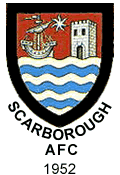 The club adopted various colours throughout their
career but since the early 1960s, red has been predominant. A crest was worn in the 1952-53 season, a simplified version of the town's coat of arms.
The club adopted various colours throughout their
career but since the early 1960s, red has been predominant. A crest was worn in the 1952-53 season, a simplified version of the town's coat of arms.
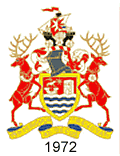 In 1968 Scarborough became founder members of the
Northern Premier League. While the Seadogs did not manage to win the championship,
they established themselves as one of the country's leading non-league
sides with three FA Trophy wins at Wembley in 1973, 1976 and 1977. The Scarborough coat of arms was worn during at least the latter part of the successful 1972-73 season.
In 1968 Scarborough became founder members of the
Northern Premier League. While the Seadogs did not manage to win the championship,
they established themselves as one of the country's leading non-league
sides with three FA Trophy wins at Wembley in 1973, 1976 and 1977. The Scarborough coat of arms was worn during at least the latter part of the successful 1972-73 season.
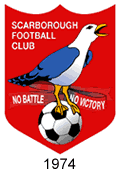 The familiar seagull badge was adopted in 1974-75 but was dropped at the end of the following season.
The familiar seagull badge was adopted in 1974-75 but was dropped at the end of the following season.
In 1976 they reached the FA Cup third round once more and lost to Malcolm Allison's fancied Crystal Palace side. Two years later they beat Rochdale and Crewe to reach the third round yet again, losing 0-3 at Brighton in front of 23,748 spectators.
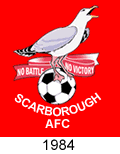 In 1979 the Alliance Premier League was formed
and Scarborough were invited to become founder members. After seven seasons
of solid but unspectacular mid-table performances, the club won the championship
of what was now the GM Vauxhall Conference and became the first club to
win automatic promotion to the Football League.
In 1979 the Alliance Premier League was formed
and Scarborough were invited to become founder members. After seven seasons
of solid but unspectacular mid-table performances, the club won the championship
of what was now the GM Vauxhall Conference and became the first club to
win automatic promotion to the Football League.
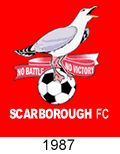 Boro' spent 12 years in the League, appearing twice
in the promotion play-offs but mainly struggling near the foot of the
table. They had some success in the League Cup, beating Chelsea 3-2 in
a replay at the Athletic Ground in 1989 and reaching the fourth round in
1993 after defeating Bradford City, Coventry and Plymouth Argyle before
narrowly losing 0-1 at home to Arsenal.
Boro' spent 12 years in the League, appearing twice
in the promotion play-offs but mainly struggling near the foot of the
table. They had some success in the League Cup, beating Chelsea 3-2 in
a replay at the Athletic Ground in 1989 and reaching the fourth round in
1993 after defeating Bradford City, Coventry and Plymouth Argyle before
narrowly losing 0-1 at home to Arsenal.
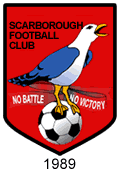 Scarborough's crest evolved somewhat during the Eighties until, in 1989 a design very similar to the 1974 original emerged. Slight variations were produced over the years, altering the colour of the lettering, surround and/or background but the overall design remained fundamentally unchanged.
Scarborough's crest evolved somewhat during the Eighties until, in 1989 a design very similar to the 1974 original emerged. Slight variations were produced over the years, altering the colour of the lettering, surround and/or background but the overall design remained fundamentally unchanged.
Following a sponsorship deal with a well-known manufacturer of frozen food, which involved the Athletic Stadium being renamed the McCain Stadium, fans dubbed their modest ground the "Theatre of Chips."
In 1999, Scarborough finished bottom of the League after a remarkable final day of the season that saw Carlisle United gain a miraculous reprieve when their on-loan goal-keeper headed home a goal deep in injury time to give the Cumbrian side a one point advantage. Relegation brought severe financial problems and a succession of new owners and boards who managed to drive the club deeper into crisis. In 2001-02 the club was brought to the verge of extinction but survived under new chairman Malcolm Reynolds.
One bright spot in this period came in 2003-04 when, having won through to the FA Cup third round, the Seadogs were drawn to play Chelsea at home. The Sun newspaper sponsored the team's kit for this match and ran articles contrasting the transfer value of the two sides. The Boro goalkeeper was offered a prize, the value of which would go up the longer he kept Chelsea out. Scarborough lost to a goal by John Terry after ten minutes but Leigh Walker did at least win a car.
Financial problems continued to beset the club and in June 2006 they were relegated to Conference North with a ten point penalty for infringing the strict insolvency rules. Twelve months later, having suffered a another relegation to the seventh tier, Scarborough was wound up at Leeds High Court with debts of £2.5m.
Shortly afterwards the Seadog Trust, took the initiative to form a new club, Scarborough Athletic who were admitted to the North East Counties League for the 2007-08 season. The all-red kit, ordered by Scarborough FC for the new season and never used was inherited by the new club as was the seagull crest.
Sources
- (a) Scarborough FC - Images of Sport (Paul Eade 2002)
- (b) James Freund
- (c) Crewe Alexandra FC - Images of Sport (Harold Finch 1999)
- (d) Port Vale FC Official Website
- (e) Scarborough Official Website
- (f) www.kipax.com
- (g) Paul Alterskye
- (h) The Seadog Bites Back was run by James Hunter who is now associated with Scarbrough Athletic
- (i) Alliance to Conference (John Harman 2005)
- (j) The Complete A to Z of Scarborough Football Club (Steve Adamson) provided by Derek Megginson
- (k) David King
- (l) Alick Milne
- (m) Roger Hopkin
- (n) James Taylor
- (o) Ralph Pomeroy
- (p) Fabrizio Taddei (Errea)
- (q) Keith Ellis
- (r) Marcus Bowen
- (s) York Herald (15th October 1890) submitted by Brian Webb
- (t) Athletic News (3 November 1902) submitted by Kingsley (Wrexham FC)
- (u) Alliance to Conference 1979-2004 submitted by Michael Gluck
- (v) Matthew Wilmot
- (w) Simon Monks
